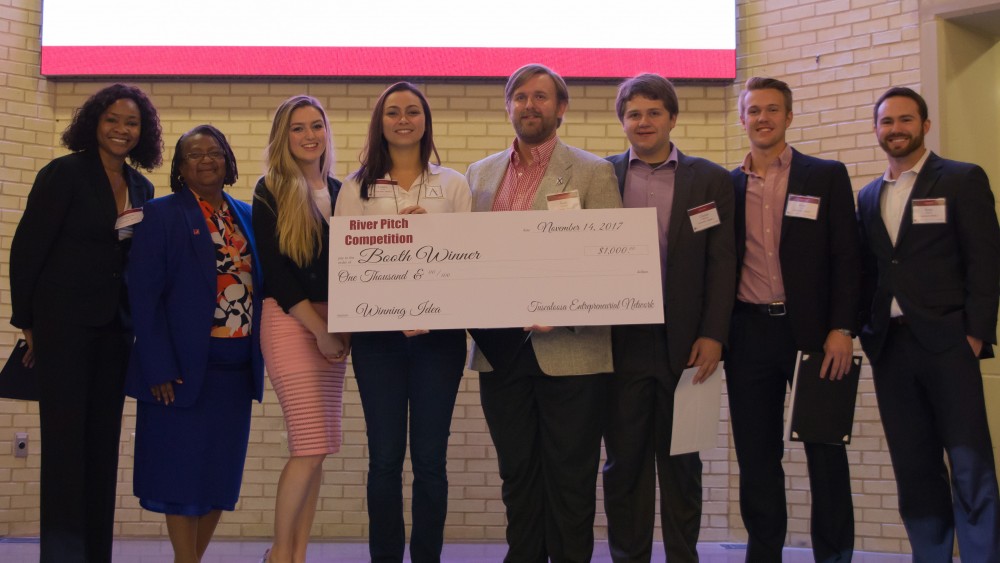Author: Kirsten J. Barnes | CCBP Correspondent
For junior marketing student Eric Voce, the River Pitch Business Idea Competition was the difference in “thinking about an idea and actually making it happen.”
Voce was one of eight $1,000 winners of a business proposal pitching competition held Nov. 14 at the Tuscaloosa River Market. Each contestant had three minutes to explain their idea, followed by four minutes for questions and two minutes for the judges to grade each presentation.
UA’s Division of Community Affairs served as a sponsor of the event through its Board of Advisors.
Board members Reginald Miller and Andrea Mabry, who serve on the Student Entrepreneurship and Innovative Initiatives Committee of the board, served as judges for the competition.
“The winners will move on to Business Plan Competition, which will be held next fall,” Miller said.
Mabry said she was impressed with the variety of ideas and the success of the first-year event.
Voce’s winning idea was a venue application called “What’s the Move,” which he came up with to help friends trying to decide on a location of where they would go on a given occasion. “The app works as advertising for the stores and restaurants and for your friends to figure out what to do each night,” Voce said.
This was exactly the kind of idea the organizers had in mind when they decided to hold the competition.
“People here have ideas and we’re just trying to give them a forum to get their ideas out,” said Theresa Welbourne, executive director of the Alabama Entrepreneurship Institute and professor of management at The University of Alabama’s Culverhouse College of Commerce. “We are excited to have UA, the Chamber of Commerce of West Alabama and the Tuscaloosa community all working together.”
The event attracted 53 contestants, and with judges and facilitators about 90 people in all. It was organized by the Alabama Entrepreneurship Institute and the EDGE Incubator and Accelerator of the Culverhouse College of Commerce, along with sponsorships from areas businesses, such as Ward Scott Architecture and other Chamber members.
“We want to build the entrepreneurship community in Tuscaloosa,” Welbourne said. “It’s really about the networking. The forum helps people learn to pitch their business ideas and to meet people who might be able to help them.”
Before the competition, UA held several workshops open to community members, faculty, staff and students. One of those faculty members, Dr. Pamela Payne-Foster, turned out to be one of the $1,000 winners. She is an associate professor in the Department of Community and Rural Medicine and deputy director of UA’s Institute for Rural Health Research. Her idea, which she already holds a patent for, is a beauty aide that attaches to a hair dryer.
“I came up with it while I was sitting at the salon under the dryer and I fell asleep,” Foster said. “My hair dropped out of the hood, so it didn’t dry. I wanted to develop an attachment to keep your head straight.” She developed the idea about 20 years ago. “I still think it is marketable. That’s why I dusted the idea off. It will save time for the client and the hairdresser,” she said.
Voce already has a prototype and a website. He said he will use the funding to continue to develop his website. “I’m going to be pitching to bars and restaurants in the next week or two. I wanted to have a visual for them to see before I went to them to try to pitch an idea,” Voce said. “Everyone seems pretty interested, especially if I can show there are going to be users.”
Voce said participating in the program has encouraged him to continue to work on his innovative ideas. “Even more than the money, it was proof of the concept. That was the most exciting thing for me,” Voce said. “The fact that people actually believed in my idea and thought that I could be successful has motivated me now to flesh it out and keep on going with it.”
Payne-Foster said she will use her funding to update her design and create a prototype using a 3D printer. “I will continue to try to refine it and market it to hair shows and beauty supply retailers. The haircare industry has annual revenue of $62 billion. It’s a big market,” Foster said.
Kirs Irwin, a Culverhouse doctoral student, has served as a facilitator for previous workshops and served as a judge for the pitch competition. “I think it’s good to bring together ideas that can actually build the community. I’m just interested to see how the contestants do and see the variety of ideas,” Irwin said. He hoped to give them good feedback so they can continue to improve their ideas.
Additional winners were Noah Campbell (concussion detection device that could be applied to sports such as football), Slade Johnston (a hunting/outdoor exchange application), Maddie Johnson (a prosthetics idea), Clayton Wagenhals (a personal apparel cooling device), Valencia Winston (flavored popcorn,) and Lauren Gwin (self-defense jewelry).
